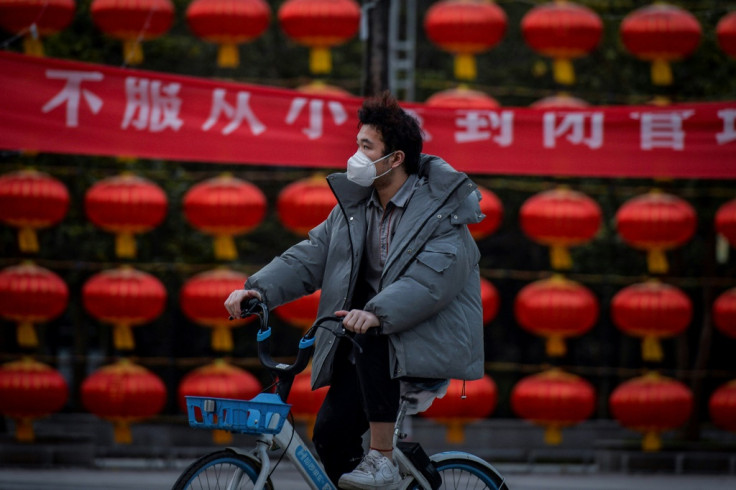Asian markets mostly up after shock Fed cut sinks Wall Street
The surprise cut came as central banks around the world pledge to do what they can to mitigate the fallout from coronavirus.
Most Asian equities rose Wednesday after the Federal Reserve slashed interest rates to combat the economic fallout from the coronavirus, brushing off a Wall Street sell-off that was fuelled by concerns the central bank was panicking.
The surprise cut came as central banks around the world pledge to do what they can to mitigate the fallout from the disease, which continues to spread to new countries and is crippling economic activity.
In announcing the reduction, the bank said US fundamentals "remain strong" but warned that the "coronavirus poses evolving risks to economic activity", the Federal Open Market Committee said in a statement.
The move, which came two weeks before the Fed's next planned policy meeting, initially sent Wall Street rallying but traders soon reversed course as they grew increasingly nervous about the economic outlook.
It also followed a much-anticipated but eventually underwhelming conference call between G7 finance ministers, which said only that they would use "all appropriate policy tools" to keep the virus epidemic from throttling growth.
Analysts questioned the Fed's timing.
"The decision by the Fed was misguided from an image point of view as it gave off the impression they are extremely worried about the coronavirus situation," said CMC Markets analyst David Madden. "And that's why US stocks fell, as traders picked up on that nervousness. Cutting rates in a rushed fashion projects the wrong image."
He added that the reduction also meant that with borrowing costs already low, the bank had limited its scope for action in future.
AxiCorp's Stephen Innes called it "a questionable use of limited ammunition", while Kerry Craig at JP Morgan Asset Management said the move "may have misfired".
All three main indexes on Wall Street ended almost three percent down.
However, Asian investors battled to build on the previous day's gains and Tokyo ended up 0.1 percent, while Shanghai added 0.6 percent. Singapore, Wellington, Taipei and Bangkok also rose, with Jakarta up two percent on hopes for further Indonesian government stimulus.
Seoul was the standout, surging more than two percent as South Korea -- which is the worst hit country outside China -- reported a sharp drop in new cases of the virus.
But Hong Kong dipped 0.1 percent in the afternoon as a gauge of Hong Kong manufacturing, construction, wholesale, retail and services fell to its lowest level on record in February.
The market was being supported by the city's de facto central bank cutting rates with the Fed owing to the local dollar's link to the US unit.
Sydney shed 1.7 percent, with Manila and Mumbai also off.
Despite the broad gains, observers pointed out that the effect of central bank action was limited and world leaders needed to work together to battle the outbreak, which has killed more than 3,000 people and infected around 92,000.
"As the spread of the coronavirus continues and the chances of containment become slimmer, the impact on the global economy is likely to be sizeable," said Anna Stupnytska, of Fidelity International.

"While easier monetary policy helps sentiment, central banks should not be acting in isolation -- the governments should step in with fiscal measures that are timely and well designed, supporting the economies that struggle not just from the virus itself but also from preventative measures that -- in some cases -- have ground activity to a halt."
The rate cut sent yields on safe-haven 10-year US Treasuries, a go-to asset in times of turmoil, below one percent for the first time on record. Gold, another fallback for worried investors, jumped almost three percent to $1,645.
And the dollar, which tanked Tuesday, continued to suffer selling in Asia, with higher-yielding, riskier units benefitting. The South Korean won was among the big gainers, adding 0.7 percent with hopes for government or central bank support also boosting that currency.
Indonesia's rupiah, the Australian dollar and Chinese yuan all rallied.
Oil prices added more than one percent after OPEC advisers suggested the group, along with other producers including Russia, slash output by up to a million barrels a day.
The recommendation comes as the oil big-hitters prepare to meet this week to discuss the crisis, which has hammered global demand for the commodity.
Tokyo - Nikkei 225: UP 0.1 percent at 21,100.06 (close)
Hong Kong - Hang Seng: DOWN 0.2 percent at 26,244.67
Shanghai - Composite: UP 0.6 percent at 3,011.67 (close)
Dollar/yen: UP at 107.45 yen from 107.15 yen at 2150 GMT
Euro/dollar: DOWN at $1.1156 from $1.1178
Pound/dollar: UP at $1.2815 from $1.2813
Euro/pound: DOWN at 87.05 pence from 87.23 pence
Brent Crude: UP 1.1 percent at $52.43 per barrel
West Texas Intermediate: UP 1.2 percent at $47.74
New York - Dow: DOWN 2.9 percent at 26,917.41 (close)
London - FTSE 100: UP 1.0 percent at 6,718.20 (close)
Copyright AFP. All rights reserved.
This article is copyrighted by International Business Times, the business news leader





















